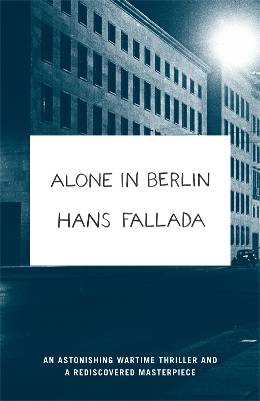
EURO CRIME
Reviews

Fallada, Hans - 'Alone in Berlin' (translated by Michael Hofmann)
Hardback: 608 pages (Feb. 2009) Publisher: Penguin Classics ISBN: 184614082X
The story begins in the summer of 1940 when postwoman Eva Kluge delivers a devastating letter to the Quangels, Otto and Anna, in their apartment at 55 Jablonski Strasse. Their only son Ottochen has fallen in France; he died "a hero's death for Fuhrer and Fatherland". Otto, a quiet foreman in a factory that makes furniture and will eventually make coffins, is provoked to take some action against the regime by Anna's stinging rebuke over the loss of her beloved Ottochen "you and that Fuhrer of yours". Otto will write anonymous postcards attacking Hitler and drop them in buildings all over Berlin. It seems to Anna Quangel a small action, but as Otto replies "if they get wind of it, it'll cost us our lives…"
The Quangels' neighbours at 55 Jablonski Strasse are a cross section of Berlin's population; an elderly Jewish woman Frau Rosenthal worried about a husband dragged off by the Gestapo; the Nazi Persickes with two sons in the SS and one, Baldur, a brutal arrogant Hitler Youth; petty criminal Emil Borkhausen, living in the back house with wife Otti who has five children by various men, and entertains 'clients'; and the enigmatic and mysterious elderly Judge Fromm. Borkhausen, along with little Enno Kluge, the postwoman's estranged husband who is a pathetic gambler and womaniser, as well as Baldur Persicke regard Frau Rosenthal and her possessions as fair game - "practically legal confiscation" - while Judge Fromm tries to protect her. Protection by disassociation is the aim of the Quangels when they break off relations with Trudel Baumann, their dead son's fiancee, who is also involved with resistance to the Nazis.
As the number of dropped postcards increases Gestapo Inspector Escherich waits, stroking his sandy moustache, patiently knowing that the man he calls the 'Hobgoblin' will eventually make a mistake and he will track him down. But Escherich is under fierce pressure to produce results from his violent superior Obergruppenfuhrer Prall and in the frightening and fearful Berlin of the Nazis anyone is just a few minutes from the basement cells of the Gestapo.
I feel a bit embarrassed giving my opinion about a book which Primo Levi has called "The greatest book ever written about German resistance to the Nazis" but frankly it was a privilege to read this brilliant novel. This novel is not about generals and grandiose plots against Hitler but a story of ordinary people and their very small efforts, in a brutal society where criminals have become the government, to remain respectable, to be good people, and to love one another. The story humanises the German people and takes the reader into a world where wrong is right and right is wrong, and lunatics decide on a whim whether you live or die. "He laughed with whole-hearted gusto. The preposterous comedy of this gang of criminals branding everyone else as criminals was suddenly too much for him to take."
As well as communicating an overwhelming atmosphere of fear and terror in the city the novel brings to life superbly drawn characters: the 'bird faced' Otto Quangel, the whining little Enno Kluge, the Gestapo Inspector Escherich who learns the truth about his work, and there are many other cameo appearances by ordinary and extraordinary Germans. There can be no finer tribute to the innocent who died fighting in their small way Nazi tyranny and barbarism, than this book, which is based on a true story of a German resistance couple who were caught distributing anti-fascist material during the war.
"As it was, we all acted alone, we were caught alone, and every one of us will have to die alone. But that doesn't mean that we are alone, Quangel, or that our deaths will be in vain. Nothing in this world is done in vain, and since we are fighting for justice against brutality, we are bound to prevail in the end."The writing is crisp and clear and this is a tribute to the translator Michael Hofmann, a German born poet who writes in English, because his family moved to Bristol when he was a young child. He was educated at Winchester College and Oxford and has written several books of poems and also translated authors such as Joseph Roth and Franz Kafka.
The author Hans Fallada, was born Rudolf Wilhelm Adolf Ditzen, and took the pen name from a Brothers Grimm tale. His great love of Germany stopped him emigrating on at least one occasion, even when his bags were packed, during the Nazi pre-war years. He had a complicated life having problems with drink and morphine addiction and spending some time in a Nazi lunatic asylum. ALONE IN BERLIN was written in 24 days shortly before his death in 1947. This Penguin Classics edition is the first published English translation in the UK and the book is indeed, as it states on the cover, a rediscovered masterpiece.
Norman Price, England
May 2009
Details of the author's other books with links to reviews can be found on the Books page.
More European crime fiction reviews can be found on the Reviews page.